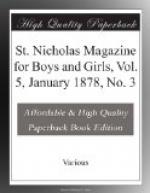[Illustration: On the spring-board.]
Then he kissed all the happy faces, and said: “Now go and play, little ones, for grandmother and I must think quietly over these God-sent gifts.”
So the children, first putting Friska, the reindeer, carefully in the little stable beside the cow (so that he should not run away from the strange new home, Hansa said), hastened to their favorite play-place,—a large pine board lying on the slope of the hill, whence they could look far away across the fields and fjords to the Kilpis, the great mountain peaks where, even in summer, the pure white snow lay glistening in the sunlight.
“Ho!” cried Niels, “that is a fine board, but no good so; see what I can do with it!” and lifted one end and put it across a great log that lay near by.
“Now you little fellows,” said he to Olaf and Erik, “I am strong as a giant, but I cannot quite roll up this other log alone. Come you and help.”
So the boys together rolled the heavy log to its place, and put the other end of the board upon it.
“Now jump!” cried Niels; and with one joyous “halloo” the children were on the broad, springy plank, enjoying to the utmost this novel pleasure.
Their shouts of delight brought the wood-cutter to the door of the little hut, and grandmother Ingeborg following, caught the excitement, and, pulling off her cap, she waved it wildly, crying: “Hurrah for the Lapps! Hurrah!”
Then she and father Peder went back to their chairs in the chimney corner; and Hansa, sitting on the spring-board, with the children around her, told them such a wonderful, beautiful story, that they were quite silent with delight.
At last said Olaf, contentedly, as he lay with his head on Hansa’s knee:
“After all, girls are the nicest things in the world!”
“Except boys,” said little Hansa, slyly.
[Illustration: Juno’s wonderful troubles.]
JUNO’S WONDERFUL TROUBLES.
By E. Muller.
Juno lived in a great park, where there was a menagerie, and neither the park nor the menagerie could have done without Juno. Now, who do you think Juno was? She was a dear old black and brown dog, the best-natured dog in the world. And this was the reason they could not do without her in the park. A lioness died, and left two little lion-cubs with no one to take care of them. The poor little lions curled up in a corner of the cage, and seemed as if they would die. Then the keeper of the menagerie brought Juno, and showed her the little lion-cubs, and said: “Now, Juno, here are some puppies for you; go and take care of them, that’s a good dog.” Juno’s own puppies had just been given away, and she was feeling very badly about it, and was rather glad to take care of the two little lions. They were so pretty, with their soft striped fur and yellow paws, that Juno soon loved them, and she took the best of care of them till they grew old enough to live by themselves. Many people used to come and stand near the big lion’s cage, and laugh to see only a quiet old dog, and two little bits of lion-cubs shut in it.




